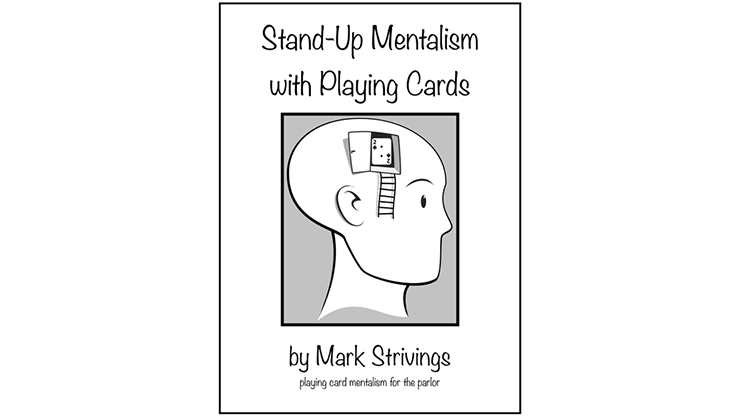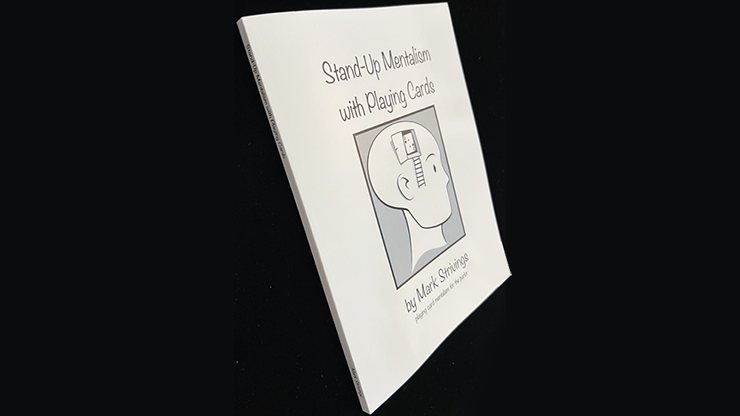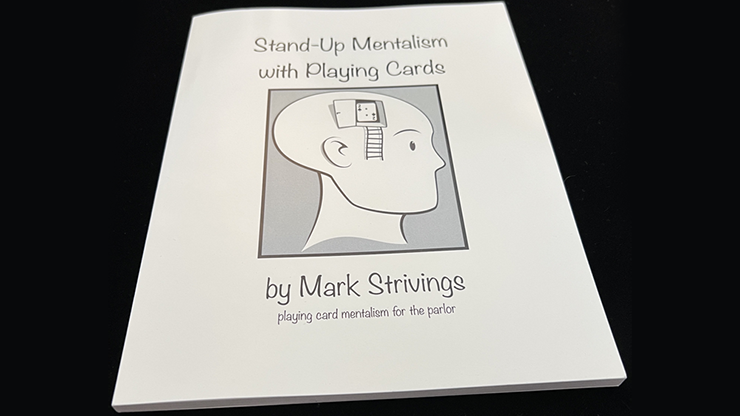Description
Pour ceux d’entre vous qui présentent des programmes de mentalisme complets, réfléchissez un instant aux lieux où vous travaillez le plus. Attention, je ne parle pas ici des magiciens de proximité qui pratiquent la magie et le mentalisme dans des salles déambulatoires ou de table en table, ni même nécessairement des magiciens qui présentent occasionnellement des numéros de mentalisme dans leurs spectacles. Cependant, ce dont nous parlons ici pourrait vous intéresser si vous faites partie de cette dernière catégorie.
Je parle principalement de spectacles de mentalisme complets, avec un public assis devant vous. Certains se produisent dans de grandes salles devant des centaines, voire des milliers de personnes. Mais je suppose que ces spectacles sont minoritaires dans cette discussion. J’ai certes déjà fait ce genre de spectacles, mais ce n’est en aucun cas la norme pour moi. J’imagine que c’est la même chose pour vous.
La grande majorité de mes spectacles de mentalisme se déroulent devant des groupes de 30 à 100 personnes et sont donc considérés comme des spectacles de salon. Mon hypothèse est que la majorité des programmes de mentalisme sont présentés dans des circonstances similaires.
Dans mes programmes de mentalisme généraux, j’ai ce que j’appelle des « emplacements » dans mon spectacle. J’entends par là que certaines parties de mon spectacle remplissent des fonctions spécifiques dans la performance globale. Nous en avons tous, et les exemples les plus évidents sont l’« ouverture » et la « conclusion ».
Nous utilisons tous du matériel à ces moments de nos spectacles, qui remplit des fonctions spécifiques.
L’ouverture est évidemment conçue pour capter l’attention et lancer le voyage que le spectacle va entreprendre. La conclusion est évidemment le grand final. Le morceau phare dont tout le monde parle à la fin du spectacle.
Dans mon spectacle, j’ai quelques « emplacements » que je considère comme des « emplacements de cartes », ce qui signifie qu’une bonne partie de mentalisme avec des cartes à jouer convient parfaitement à cet endroit du spectacle.
Je m’assure d’avoir toujours du matériel supplémentaire avec moi lorsque je suis sur scène. Il y a plusieurs bonnes raisons à cela. Pour commencer, on ne sait jamais quand un problème peut survenir et qu’il faut remplacer le morceau prévu. Il se peut que vous deviez soudainement prolonger votre performance. Vous pourriez arriver au spectacle et constater que les conditions pour certains morceaux ne sont tout simplement pas réalisables. Tout cela, et bien d’autres, est tout à fait possible. Il y a de nombreuses années, j’ai même eu un cas où j’ai fait appel à une volontaire du public qui devait suivre des instructions les yeux fermés. Seul problème : elle était sourde ! Je n’avais aucun moyen de le savoir. Heureusement, j’avais du matériel de remplacement sur scène.
Grâce à cela, j’ai des « options » pour presque tous les créneaux de mon spectacle. Ce sont des morceaux qui, bien que différents les uns des autres, répondent à des exigences similaires à celles que j’ai à certains moments du spectacle. C’est particulièrement vrai pour la partie « cartes » du programme.
Avez-vous déjà fait un spectacle et, en rentrant chez vous en voiture, vous êtes-vous dit qu’un autre jeu aurait peut-être mieux fonctionné ? Je sais que c’est arrivé. À maintes reprises.
Grâce à ce choix, je peux littéralement décider instantanément de ce qui me semble être la meilleure option pour ce public et ce spectacle.
Et c’est précisément le sujet de ce livre.
Lorsqu’on cherche du matériel de jeu de cartes pour la plupart des situations de stand-up, la plupart des artistes se tournent immédiatement vers le classique Tossed Out Deck, et à juste titre. Ce n’est pas pour rien qu’il est un classique. Mais une fois ce choix dépassé, la liste s’amenuise rapidement. Il existe une multitude de jeux de cartes de type mentalisme pour les artistes de Close-up, mais une fois sur scène, les options disponibles diminuent considérablement.
C’est là qu’intervient ce tout nouveau livre de Mark Strivings.
Au fil des ans, j’ai accumulé une quantité appréciable de matériel qui fonctionne parfaitement dans ces conditions de salon. Certains sont ma propre interprétation d’intrigues classiques, d’autres sortent des sentiers battus. Quoi qu’il en soit, tout cela est prêt à l’emploi, je peux le sortir et le jouer. Et avoir le luxe de pouvoir disposer immédiatement d’un matériel varié de ce type, prêt à l’emploi à tout moment, m’évite beaucoup de soucis dans de nombreuses situations de représentation.
Pour moi, la partie « cartes » du spectacle est suffisamment avancée pour que je puisse bien appréhender le public, sa réaction et l’ambiance générale. Fort de ces informations, je peux choisir immédiatement le matériel qui me semble le plus adapté à ce programme. C’est une méthode de travail incroyablement commerciale.
Certes, cela implique de transporter un peu plus de matériel, mais au final, cela en vaut vraiment la peine. La tranquillité d’esprit et la flexibilité globale valent leur pesant d’or à mes yeux.
Cette collection comprend plus de 15 articles couvrant diverses intrigues et effets, tous utilisant des cartes à jouer comme principal, voire unique accessoire. Tous ces effets peuvent être configurés à l’avance et prêts à l’emploi dès leur sortie du coffret, et tous sont incroyablement simples à réaliser.
Certains effets impliquent la participation du public, d’autres font appel à des volontaires sur scène.
Voici quelques-uns des miracles inclus :
Miracle 2 étoiles et demie – probablement la meilleure interprétation du Miracle Cinq Étoiles du Coran jamais réalisée. Cela tromperait même le Coran !
Une correspondance parfaite : un effet de prédiction incroyablement simple, idéal dans un scénario plus vaste ou comme effet indépendant.
Une œuvre d’art : une duplication de design incroyablement simple et efficace à l’aide de cartes artistiques.
L’onde cérébrale invisible ultime : potentiellement la meilleure interprétation du principe classique de l’onde cérébrale jamais créée. Si vous assistiez à une représentation de ce principe, vous seriez complètement dupé, c’est garanti. Si vous pouviez le faire pour de vrai, voici à quoi cela ressemblerait.
Chaîne de pensée : une autre interprétation du principe classique de l’onde cérébrale, incroyablement commerciale et absolument géniale. « C’est magnifique ! » – Dean Dill après avoir assisté à une représentation de Chaîne de pensée.
Défi Nom-une-Carte : une interprétation merveilleusement simple et commerciale de l’intrigue classique de « Prémonition », sans cartes supplémentaires dans les poches. C’est un jeu efficace !
Crimped Coincidence : une présentation amusante et facile du type « aiguille dans une botte de foin » avec une sélection gratuite et un sac rempli de cartes pliées. C’est un jeu de cartes !
Many Tekel Deck : une version remarquable du jeu classique mene tekel qui vous permet non seulement d’afficher le jeu ouvertement, mais aussi de travailler avec jusqu’à quatre cartes simultanément. Si vous connaissez le jeu mene tekel, vous savez à quel point c’est impressionnant !
Open & Shut : un classique de Strivings ! Une carte est prédite ouvertement, un nombre compris entre 1 et 52 est nommé (sans aucune limitation), les cartes sont comptées et voilà la carte prédite. Incroyablement propre !
Par-Optic Plus : une version du classique « Par Optic Vision » d’Annemann. D’une propreté irréprochable. À faire avec ou sans bandeau sur les yeux. Incroyablement puissant et pourtant si simple.
Influence psychique – CINQ manipulations différentes. Sans aucun doute l’effet le plus unique du livre. Cette prédiction semble tout simplement impossible et peut utiliser un jeu emprunté que l’interprète ne touche jamais. Absolument incroyable. Et presque automatique.
Et plus encore.
TOUS ces effets sont incroyablement faciles à réaliser. Il faut travailler en amont sur presque tous, mais la réalisation est on ne peut plus simple.
- Pas de tour de passe-passe
- Simple à réaliser
- Réinitialisation facile
- Tout est préréglé à l’avance. Il suffit de sortir le jeu et de faire le tour.
Et plus encore !
Deux essais sont également inclus. L’un traite de mon point de vue sur l’utilisation des cartes à jouer en mentalisme (apparemment, cela ne me pose aucun problème), mais il expose également des réflexions qui ne sont jamais abordées lorsque ce sujet est constamment relayé en ligne. J’aborde également la manière dont ma position s’applique spécifiquement au travail de salon.
Le deuxième essai détaille ma philosophie concernant la mise en scène d’un spectacle. Certains points ont déjà été abordés précédemment, mais nous y allons vraiment.
Il y a aussi une courte section consacrée à quelques tours très simples qui ne sont absolument pas nécessaires pour réaliser ces effets, mais qui constituent de très bons moyens de convaincre. Gardez à l’esprit qu’aucun de ces effets ne nécessite de tours de passe-passe, à moins que vous ne souhaitiez ajouter ces tours très simples qui peuvent ajouter une couche de tromperie solide à votre performance.
Le livre lui-même compte près de 100 pages, relié sans couture avec des couvertures cartonnées.
Il n’existe aucun autre ouvrage comparable dans la littérature du mentalisme, et il a sa place dans la bibliothèque de tout mentaliste.



